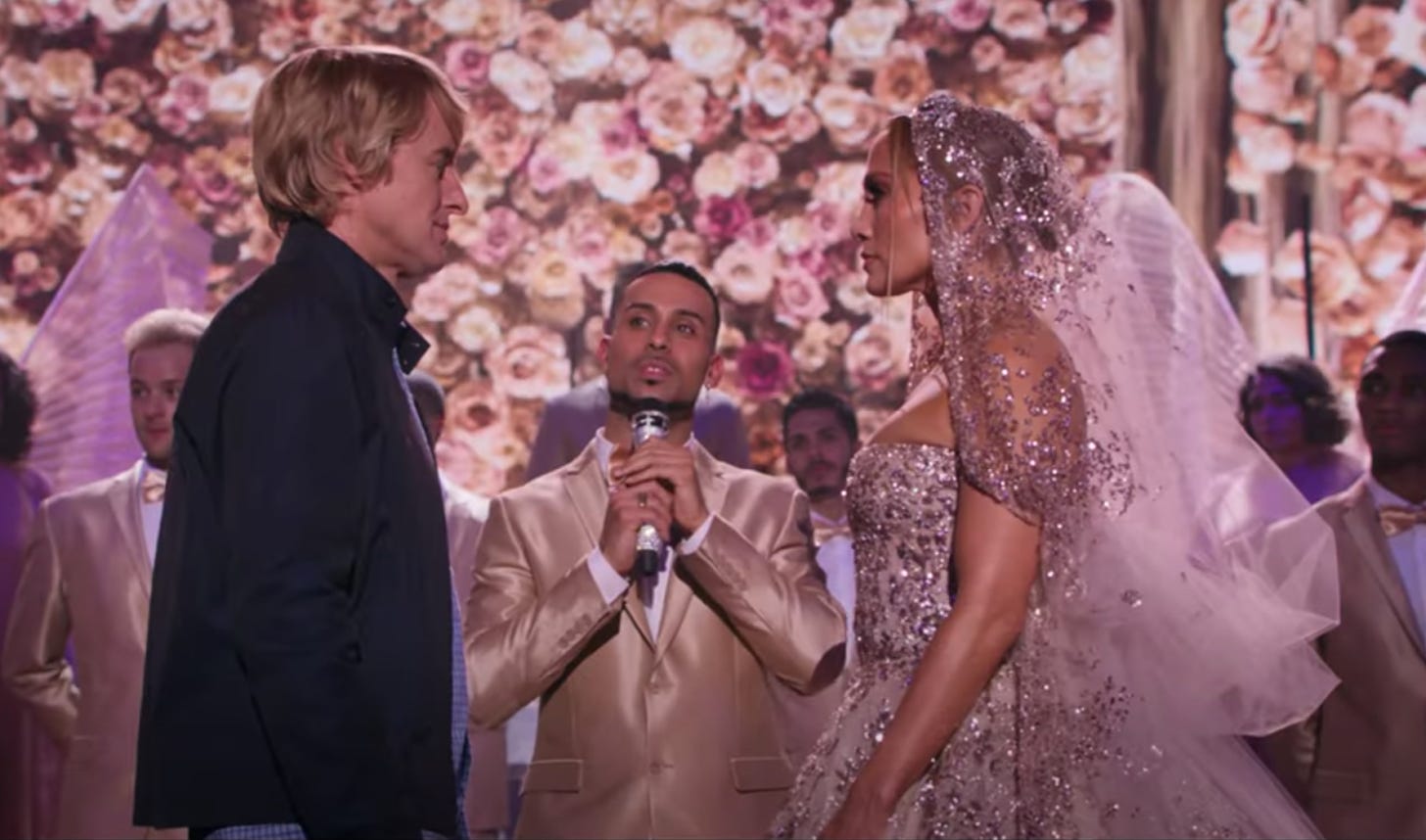In Review: 'Kimi,' 'Marry Me'
What do a brilliant shut-in trying to solve a crime, a pop star, and a math teacher have in common? They're all characters in two pretty good new movies.
Kimi
Dir. Steven Soderbergh
89 min.
Much of Francis Ford Coppola’s 1974 masterpiece The Conversation comes straight from the dark, paranoid heart of the early 1970s but, in at least one moment, the movie looks to the future. At a trade show, a security expert with a flair for showmanship demonstrates the latest in bugging technology by listening in on his own home, only to hear his wife and her lover on the verge of an intimate moment. He looks mortified until revealing it was just a gag. The tension lifts, but the implications linger. What happens to privacy when technology can crash through every closed door? Where do secrets go to hide when staying wired to the rest of the world stops being optional?
Directed by Steven Soderbergh from a script by David Koepp (Panic Room), Kimi raises some of the same issues, but like Coppola's security salesman, it rarely dwells on them. A thriller tied to the capabilities of Kimi, a popular virtual assistant in the mold of Siri and Alexa, the film takes place in a world The Conversation foretold, which looks a lot like the world around us. But Kimi’s killer feature is its personal touch. Its smarts and capabilities are continually refined by a team of experts who listen to recordings of moments when Kimi has failed its users — like its inability to discern when “me” functions not as a pronoun but as the name of a Taylor Swift song — and make adjustments for the future.
It’s thankless work, but the perfect job for Angela (Zoe Kravitz), an agoraphobic Seattleite who tirelessly sorts through a queue of anonymous Kimi streams from the comfort of her spacious apartment. She spends her days listening to strangers and talking via screens to everyone from her mother (Robin Givens) to her dentist (David Wain) — everyone except the handsome attorney across the street whom she invites to her place at night, even though she can’t summon the courage to meet up for breakfast at a nearby food cart.
She’s created a functional, if limited, life for herself, one from which she has no concrete plans to stray even to attend to a toothache. Until, that is, she hits a stream that seems to contain a recording of a crime. Unable to follow the advice of her superior (Andy Daly) and just let it go — the company hates these situations so much that it's easier just not to deal with them — she steels herself to venture out to meet with a sympathetic sounding exec (Rita Wilson) who promises to work with her to bring the matter to the proper authorities. It’s only when Angela is far from home (well, quite a few blocks anyway) that she realizes she’s in over her head.
Kimi builds pressure with each scene as Angela discovers that perils she’s feared in the outside world are not only real but even worse than she imagined. But, shades of Melancholia, the mindset that's shut her off from so much also gives her a rare ability to survive the shadowy forces of the conspiracy in which she finds herself enveloped. Soderbergh balances the chilly precision of his filmmaking against the combination of fragility and hardened will to live that defines Kravitz’s deft performance. She plays Angela as a smart, resourceful woman who’s as determined and assertive as the boundaries of her condition allow. Cowering beneath a hoodie and head of blue hair, she’s as vulnerable as she appears but also a force her enemies underestimate at their own peril.
Both gripping and resonant, Kimi makes no effort to make any grand statements about how we live now, but it ends up shedding light on the present anyway, depicting an interlinked world in which it’s all but impossible to disappear — and where those with power can always find those who try. It all builds to an incredibly satisfying final act, one that reveals how much of what’s come before has been a set-up without trumpeting its own cleverness. It’s a brilliantly constructed machine about beautifully constructed machines, but one that finds abundant room for humanity. —Keith Phipps
Kimi debuts on HBO Max Friday, February 10.
Marry Me
Dir. Kat Coiro
112 min.
Love means never having to say you’re sorry to Jimmy Fallon.
Or maybe it does. Whatever the case, Fallon’s multiple appearances in Marry Me feel less like a throwback to the era when Larry King, Jay Leno, or other talk show hosts would pop in to comment on developments within a movie, but a denial that that era ever ended. For a film that’s reasonably savvy about celebrity brand reinforcement in 2022—one that is about reinforcing Jennifer Lopez’s celebrity brand, in fact—Marry Me has a Rip Van Winkle quality to it, as if a ‘00s rom-com woke up today and didn’t realize that time had passed. Perhaps, the thinking goes, if nobody acknowledges that major studios don’t make these kinds of movies anymore, one can slip through the system.
Marry Me has the good sense to rip off one the best of the rom-com boom, reviving the Notting Hill formula of a massive star dating a modest nobody under the watchful lenses of the paparazzi. Both films function as effective meta-statements for their female leads, too: In 1999, Julia Roberts was the biggest star in Hollywood, naturally eager to prove that she’s a normal person who could date a humble British travel bookstore owner who blinks and stammers a lot. Here Lopez is still Jenny from the block, living a glamorous life on camera but longing for a connection that’s more intimate and elemental than an Instagram Live feed. Maybe the answer is a divorced math teacher from Flatbush.
The meet-cute in Notting Hill is simple. The famous actress walks into the bookstore and there’s Hugh Grant’s clerk, and they meet again when he bumps into her on a street corner and spills juice on her shirt. Here it’s much more tortured, by far the biggest obstacle the film has to clear. After three failed marriages, pop star Kat Valdez (Lopez) plans to make her fourth a global event, turning her concert at Madison Square Garden into a ceremony where she intends to marry Bastian (Maluma), her partner on a new duet single, right there onstage. Meanwhile, Charlie Gilbert (Owen Wilson), an earnest but painfully uncool dad, scores two extra tickets to the show, hoping to gain a little credibility with his daughter (Chloe Coleman). When Kat discovers mid-concert that Bastian had an affair with her assistant, she impulsively picks plain ’ol Charlie from the crowd and marries him instead.
To work, Marry Me must convince us Kat and Charlie share a moment and a connection that night, Lopez and Wilson sell it exceptionally well, with Wilson adding a sad, sympathetic gaze to a look of honest boredom at the whole affair. He’s the only guy in the crowd not checking his social media feeds—he still has a flip phone—and is the opposite of Bastian, a much younger guy whose Insta is a tool for his public displays of affection for Kat that he doesn’t live up to IRL. And so, as Charlie reluctantly agrees to keep up appearances for a few months of pretend marriage before signing an NDA and collecting a sizable donation for his Math Club team, Marry Me becomes a film about a nonsense relationship that grows into a real one. But keeping up appearances does lead to a natural getting-to-know-you phase, and Kat’s counterintuitive instincts about Charlie’s offline integrity prove to have some merit.
The irony of Marry Me, as with Notting Hill, is that it’s about a celebrity who longs for workaday authenticity, but celebrity is what gives the film its juice, raising the stakes on a relationship that would otherwise only be as pleasing as its passable banter. Lopez’s star power is overwhelming here, almost alien, which makes Wilson every bit her improbably perfect match, quietly yielding the floor to her while occasionally offering jokes or reassurances in his gentle Texas lilt. There was a time when every Wilson role felt like a variation on his Dignan character in Wes Anderson’s Bottle Rocket, and a romance with a famous, sexy yet down-to-earth pop star sure looks like a great development for that middle-aged math teacher.
Perhaps durability is the secret theme of Marry Me, with two stars who ascended at roughly the same time (Bottle Rocket was 1996, Lopez’s sensational turn in Out of Sight was 1997) have both stayed in the picture, and now are proving that a dead subgenre may have a little life in it yet. Like rom-coms of the past, Marry Me has a warped idea of what “humble” looks like—Charlie occupies a Nancy Meyers condo on a teacher’s salary, and Kat makes the ultimate sacrifice by flying coach—but the unreality of some elements winds up heightening those moments when Kat and Charlie connect like real mortals. Just like Kat and Charlie, Lopez and Wilson make the outrageously silly and contrived seem totally natural. — Scott Tobias
Marry Me opens in theaters everywhere and streams on Peacock starting Friday.










Owen Wilson have real flair for bringing spark to otherwise mediocre movie, but boy me wish he not had to do that so often. But it seem like no one besides Wes Anderson all that interested in putting him in good movie.
So...exactly how much Jimmy Fallon? Because that might determine how likely I am to watch this.